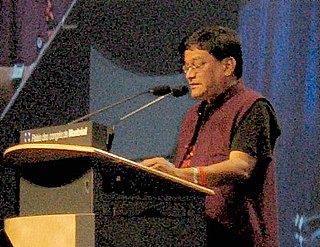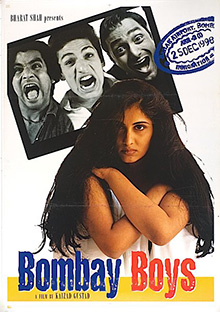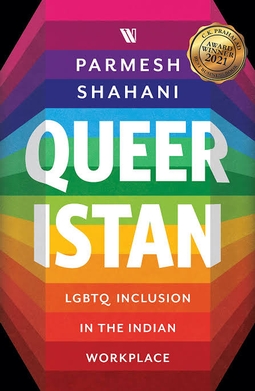Related Research Articles

The Indian Institute of Technology Bombay is a public research university and technical institute in Mumbai, Maharashtra, India.

University of Mumbai is a public state university in Mumbai. It is one of the largest university systems in the world with over 549,000 students on its campuses and affiliated colleges. As of 2013, the university had 711 affiliated colleges.

Thadomal Shahani Engineering College (TSEC) is a private engineering college in Mumbai, India. Founded in 1983, it is the first and oldest private engineering institute affiliated with the University of Mumbai.
Homosexuality in India is socially permitted by most of the traditional native philosophies of the nation, and legal rights continue to be advanced in mainstream politics and regional politics. Homosexual cohabitation is also legally permitted and comes with some legal protections and rights.

Ashok Row Kavi is an Indian journalist and LGBT rights activist.

Bombay Boys is a 1998 Indian crime comedy film written and directed by the Indian director Kaizad Gustad. It follows the adventures of three young men in modern-day Mumbai. The boys are of Indian origin, but were all raised in the West. Krishna Sahni is an aspiring actor from New York City who wants to make it big in Bollywood. Ricardo Fernandes is from Sydney and is in Mumbai to search for his long-lost brother. Finally, Xerxes Mistry, a musician from London, is looking to discover his "roots" in the land of his ancestors.

The Hyderabad (Sind) National Collegiate Board or HSNC Board is an Indian non-profit organisation founded in 1922 in the British India province of Sind and moved to Bombay, India after the 1947 Partition. It is one of the oldest educational trusts of India and currently administers 27 institutes under its umbrella including the HSNC University, Mumbai.
Narendra Kumar Patni was an entrepreneur and IT visionary who founded Patni Computer Systems and helped establish the overall Indian IT industry. He is considered a "pioneer of India's information technology (IT) services revolution" and a "doyen of the industry" Patni was listed in the Forbes list of India's 40 Richest in 2005.
Badnam Basti is a 1971 Bollywood drama film directed by Prem Kapoor and adapted from an eponymous novel by Hindi novelist Kamleshwar. Starring Nitin Sethi, Amar Kakkad, and Nandita Thakur, it is often described as India's first gay film. The film was thought to have been lost for 40 years, but a print was found in 2019.
Romesh T. Wadhwani is an Indian-American billionaire, businessman and head of investment firm SAIGroup. He is the former chairman and CEO of Symphony Technology Group, a private equity firm for software, Internet and technology services companies. He established the Wadhwani Foundation for economic development in emerging economies, with an initial focus on India. Initiatives in India include the National Entrepreneurship Network.
The KASHISH Pride Film Festival is an annual LGBTQ event that has been held in Mumbai, India, since 2010. The film festival screens gay, lesbian, bisexual, transgender and queer films from India and around the world. It is voted as one of the top five LGBT film festivals in the world.

LGBTQ people are well documented in various artworks and literary works of Ancient India, with evidence that homosexuality and transsexuality were accepted by the major dharmic religions. Hinduism and the various religions derived from it were not homophobic and evidence suggests that homosexuality thrived in ancient India until the medieval period. Hinduism describes a third gender that is equal to other genders and documentation of the third gender are found in ancient Hindu and Buddhist medical texts. The term "third gender" is sometimes viewed as a specifically South Asian term, and this third gender is also found throughout South Asia and East Asia.
This is a timeline of notable events in the history of non-heterosexual conforming people of South Asian ancestry, who may identify as LGBTIQGNC, men who have sex with men, or related culturally-specific identities such as Hijra, Aravani, Thirunangaigal, Khwajasara, Kothi, Thirunambigal, Jogappa, Jogatha, or Shiva Shakti. The recorded history traces back at least two millennia.
Chennai has LGBTQIA cultures that are diverse concerning- socio-economic class, gender, and degree of visibility and politicisation. They have historically existed in the margins and surfaced primarily in contexts such as transgender activism and HIV prevention initiatives for men having sex with men (MSM) and trans women (TG).
Suhas Pandurang Sukhatme is an Indian scientist, teacher, author and a former chairman of the Atomic Energy Regulatory Board of the Government of India, known for his expertise in heat transfer and energy technologies. He was honoured by the Government of India, in 2001, with the fourth highest Indian civilian award of Padma Shri.
Tamil sexual minorities are Tamil people who do not conform to heterosexual gender norms. They may identify as LGBTQIA. It has been estimated that India has a population of 2.5 million homosexuals, though not all of them are Tamil, and not all Tamils live in India.
LABIA is an organization for queer and transgender people in Mumbai, India. It was founded in 1995 as Stree Sangam, and is often cited as a significant organization in the history of LGBTQ organizing in India.

Gay Bombay is an LGBTQ social organization in Mumbai, India, which promotes LGBT rights. It was founded in 1998. The organization works to create an awareness of gay rights through workshops, film screenings, and parties. The organisation aims to create a safe space for the LGBT community.

Queeristan is a book written by Parmesh Shahani. The book was published in 17 August 2020 by Westland Books.
References
- ↑ "Parmesh Shahani: 'We are still not equal today'" . Frontline. 2022-06-26. Retrieved 2023-08-12.
- ↑ Modi, Chintan Girish (2021-03-26). "Queer at the workplace: Parmesh Shahani nudges companies to be inclusive". Business Standard . Retrieved 2023-08-11.
- 1 2 3 4 5 Whitacre, Andrew (2014-01-09). "Parmesh Shahani, SM '05: "Drawing Inspiration from Mumbai"". Massachusetts Institute of Technology | Comparative Media Studies. Retrieved 2023-08-11.
- ↑ Shahani, Parmesh (2011-06-27). "Why Gay Employees Need To Come Out". Forbes India . Retrieved 2023-08-12.
- 1 2 Jain, Aashika (2018-11-13). "How Parmesh Shahani is Batting For Equality at The Workplace". Entrepreneur . Retrieved 2023-08-10.
- ↑ Sengupta, Ishita (2020-09-11). "Struggle for LGBTQ rights is deeply connected to other social justice movements: Parmesh Shahani on his new book, Queeristan". The Indian Express . Retrieved 2023-08-10.
This article needs additional or more specific categories .(May 2024) |